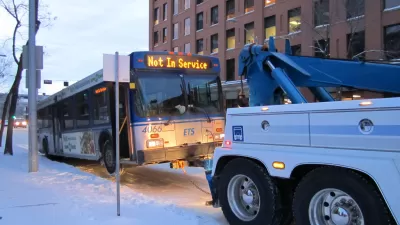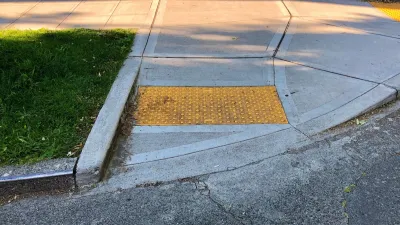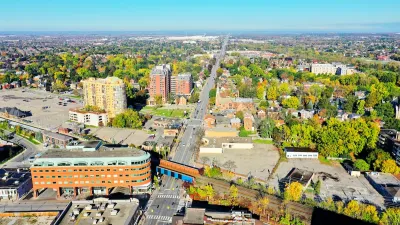Vox brings out the subtleties in explaining the underperformance of the U.S. public transportation system.

Joseph Stromberg writes an article about the state of transportation in the United States that's part explainer and part polemic by asking the question: "The US spends a ton of money on public transportation. So why is it so terrible?"
After citing some statistics to back up the claim that transit systems in Europe and Asia outperform U.S. transit, Stromberg first debunks a common scapegoat for the woes of transit in the United States: "Most of our cities and suburbs were built out after the 1950s, when the car became the dominant mode of transportation. Consequently, we have sprawling, auto-centric metropolises that just can't be easily served by public transportation."
Canada, however, can be cited as an example of country with a similar development pattern that managed to avoid the ravages of poor transit. Finally, Stromberg settles on his answer: "European, Asian, and Canadian cities treat it as a vital public utility. Most American policymakers — and voters — see transit as a social welfare program."
The article goes into a lot more detail about how exactly the politics of mobility achieved its effect in the United States, as well as describing more consequences of, and potential responses to, the state of public transportation.
FULL STORY: The real reason American public transportation is such a disaster

Alabama: Trump Terminates Settlements for Black Communities Harmed By Raw Sewage
Trump deemed the landmark civil rights agreement “illegal DEI and environmental justice policy.”

Planetizen Federal Action Tracker
A weekly monitor of how Trump’s orders and actions are impacting planners and planning in America.

Why Should We Subsidize Public Transportation?
Many public transit agencies face financial stress due to rising costs, declining fare revenue, and declining subsidies. Transit advocates must provide a strong business case for increasing public transit funding.

Understanding Road Diets
An explainer from Momentum highlights the advantages of reducing vehicle lanes in favor of more bike, transit, and pedestrian infrastructure.

New California Law Regulates Warehouse Pollution
A new law tightens building and emissions regulations for large distribution warehouses to mitigate air pollution and traffic in surrounding communities.

Phoenix Announces Opening Date for Light Rail Extension
The South Central extension will connect South Phoenix to downtown and other major hubs starting on June 7.
Urban Design for Planners 1: Software Tools
This six-course series explores essential urban design concepts using open source software and equips planners with the tools they need to participate fully in the urban design process.
Planning for Universal Design
Learn the tools for implementing Universal Design in planning regulations.
Caltrans
Smith Gee Studio
Institute for Housing and Urban Development Studies (IHS)
City of Grandview
Harvard GSD Executive Education
Toledo-Lucas County Plan Commissions
Salt Lake City
NYU Wagner Graduate School of Public Service





























